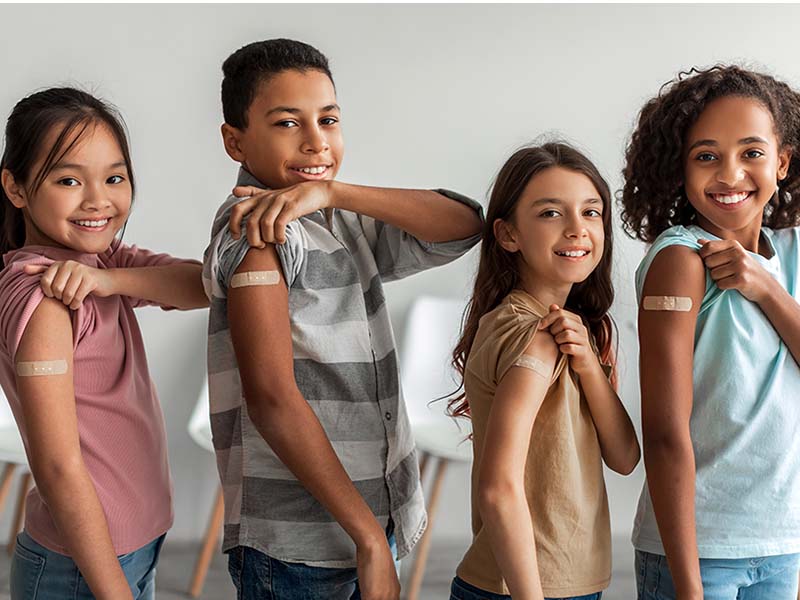After nearly two years of missed sleepovers, no indoor playdates and canceled birthday parties with friends, many children have been really excited to get vaccinated against COVID-19. I’ve seen children eager to roll up their sleeves to get a shot, and their parents are breathing a huge sigh of relief.
Some parents, however, have chosen to take a wait-and-see approach to getting their 5-11-year-old children vaccinated. While I recognize that some parents have concerns, I urge them to sign their children up for the vaccine as soon as possible.
Why?
The COVID-19 Pfizer vaccine authorized in October is safe and effective. The clinical trial enrolled thousands of children, and the children demonstrated a “strong immune response” a few weeks after the second dose. Data show that the vaccine is more than 90% effective at preventing symptomatic illness in this age group. Vaccinating our children offers them protection and a chance to safely enjoy activities they may have missed since the start of the pandemic.
Like adults and adolescents, children ages 5-11 must receive two doses of the vaccine, spaced approximately 21 days apart, to be considered fully vaccinated. The vaccine for children in this age group is one third the dosage of the vaccine that has been authorized for those ages 12 and older. The lower dose has been shown to be effective for children while resulting in few side effects.
Many parents are concerned about side effects. As with other vaccines given to children, mild side effects are common and are a sign the body is mounting an immune response. The most common side effect with the COVID-19 vaccine for children is soreness at the injection site. Some children reported fatigue, headache, fever, chills and muscle aches. These side effects usually develop within a day or two of receiving the vaccine and generally subside a day or two thereafter. More children develop side effects after the second dose than after the first dose.
Some parents are nervous their children will develop myocarditis from the vaccine. Myocarditis is inflammation of the heart muscle. A small percentage of teenagers and young adults developed myocarditis after receiving the COVID-19 vaccine. Fortunately, these cases have been mild and treated successfully with medication and rest. It’s important to note that myocarditis occurs more often with COVID-19 infection than after the vaccine, and those who get myocarditis as a result of COVID-19 infection tend to have more severe cases. No cases of myocarditis were reported in clinical trials for children ages 5-11.
Some parents have said they are worried the vaccine will lead to infertility. There are no reports of any impact on fertility; no loss of fertility was reported in adult women or men in clinical trials or in the millions of women and men who have received the vaccine in the past year. Also, side effects from vaccines generally happen within days of receiving the shot, not months or years in the future.
A few other important things to keep in mind:
- Children who have had COVID-19 should be vaccinated. Though children who have had COVID-19 will have antibodies to help fight the virus, being vaccinated provides an important, longer-lasting layer of protection. Children with a current COVID-19 infection should wait until they are no longer sick and no longer in isolation before getting vaccinated.
- Children with a known exposure to someone with COVID-19 should wait until their quarantine period has ended so they don’t potentially expose healthcare workers to the virus.
- Getting the COVID-19 vaccine at the same time as other vaccinations is okay. If your child is due for a flu shot or any childhood vaccination, getting the immunizations at the same appointment is completely safe.
I often am asked by parents whether dosing of the vaccine is determined by the child’s age or by the child’s weight. Vaccine dosing is determined by a child’s age on the day of vaccination. That means a big 11-year-old will get the smaller dose, and a small 12-year-old will get the larger dose. This is safe and has been studied. In their first years of life, small infants get the same dose as large infants. Clinical trial participants were of different weights.
Some parents also wonder whether, if their child’s twelfth birthday is approaching, they should wait to have their son or daughter vaccinated until after the birthday in order to receive the full dose. I encourage parents to get their children vaccinated at the earliest possible opportunity to minimize the risk of contracting the virus. A child will receive the smaller dose at age 11 and the larger dose at age 12 if their birthday falls before the second dose.
Remember, the benefits of the vaccine far outweigh the risks. We want to protect our children from a virus that has killed millions of people worldwide. Even though children tend to have milder COVID-19 illness than adults, some children do suffer greatly. Even patients who had fairly mild courses of illness may still suffer long-term symptoms, such as loss of taste and smell, headaches, shortness of breath and fatigue.
Vaccinating our children protects them, their friends, their family and their community against this virus. I had my teenage children vaccinated as soon as they were eligible. I encourage you to have your children vaccinated as well.
Related
Let’s Talk COVID-19 Vaccine for Teens
Everything you Need to Know About Vaccine Fraud
Tips for a Family Vacation During COVID

